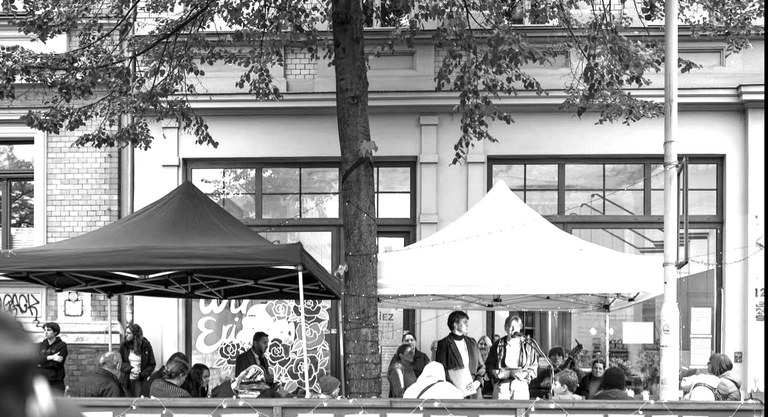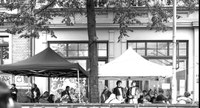
Lokale Räume zur Stärkung der Resilienz
Die Bedeutung lokaler Räume als Orte der Begegnung im postmigrantischen Kontext untersuchen Emma Luna Brahm, Kübra Gencal und Daniel Kubiak (BIM) in einem Beitrag für W&F am Beipiel des Cafés Tekiez in Halle. / In an article for W&F, Emma Luna Brahm, Kübra Gencal and Daniel Kubiak (BIM) examine the importance of local spaces as places of encounter in a post-migrant context, using the example of the Tekiez café in Halle.
Emma Luna Brahm & Kübra Gencal & Daniel Kubiak:
Postmigrantische Räume. Das TEKİEZ in Halle als Raum gesellschaftlicher Begegnung und Resilienz
Dieser Artikel stellt das TEKİEZ als Ort vor, der sich als Raum der Solidarität, der Erinnerung und der Resilienz in der ostdeutschen Großstadt Halle (Saale) herausgebildet hat. Die Umgestaltung war vor allem von der Frage geleitet, wie ein Raum konstituiert werden kann, wo Solidarität sichtbar und praktisch erfahrbar werden kann. Das Anliegen war es im TEKİEZ „über Rassismus, über Antisemitismus und darüber, wie es halt gehen kann, sich auch solidarisch zu zeigen und zusammen solidarische Gesellschaft zu üben und lernen zu können“, wie in einem Interview erzählt wurde. Solche Orte sind in postmigrantischen Gesellschaften wichtige Pole resilienter Praktiken, die wir in diesem Beitrag genauer ausführen wollen.
>online (kostenflichtige Ausgabe): https://wissenschaft-und-frieden.de/ausgabe/krise-der-weltpolitik-multilateralismus-gefragt/
Emma Luna Brahm & Kübra Gencal & Daniel Kubiak:
Postmigrant spaces. The TEKİEZ in Halle as a space for social encounters and resilience
This article presents the TEKİEZ as a place that has emerged as a space of solidarity, remembrance and resilience in the East German city of Halle (Saale). The remodelling was primarily guided by the question of how a space can be constituted where solidarity can be made visible and experienced in practice. The aim of the TEKİEZ was to ‘talk about racism, anti-Semitism and how it is possible to show solidarity and practise and learn about solidarity together’, as was explained in an interview. Such places are important poles of resilient practices in post-migrant societies, which we want to explore in more detail in this article.
>online (German only): https://wissenschaft-und-frieden.de/ausgabe/krise-der-weltpolitik-multilateralismus-gefragt/

